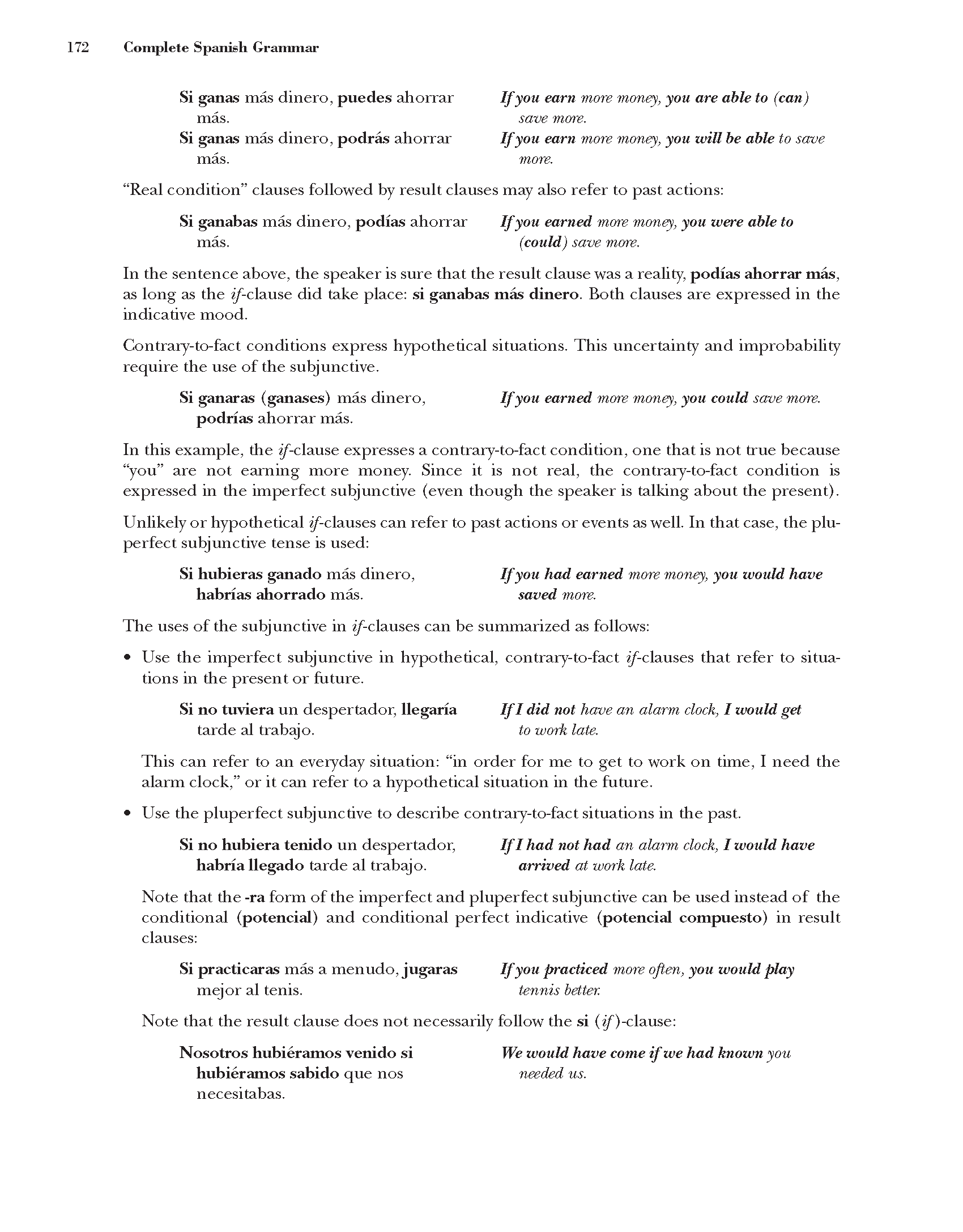CSG183

Complete Spanish Grammar
Si ganas mas dinero, puedes ahorrar mas.
Si ganas mas dinero, podras ahorrar mas.
Ifyou earn morę money, you are able to (can)
save morę.
Ifyou earn morę money, you will be able to scwe morę.
“Real condition” clauses followed by result clauses may also refer to past actions:
Si ganabas mas dinero, podias ahorrar Ifyou earned morę money, you were able to
mas. (could) save morę.
In the sentence above, the speaker is surę that the result clause was a reality, podias ahorrar mas, as long as the if-clause did take place: si ganabas mas dinero. Both clauses are expressed in the indicative mood.
Gontrary-to-fact conditions express hypothetical situations. This uncertainty and improbability require the use of the subjunctive.
Si ganaras (ganases) mas dinero, Ifyou earned morę money, you could scwe morę.
podrias ahorrar mas.
In this example, the if-clause expresses a contrary-to-fact condition, one that is not true because “you” are not earning morę money. Since it is not real, the contrary-to-fact condition is expressed in the imperfect subjunctive (even though the speaker is talking about the present).
Unlikely or hypothetical if-clauses can refer to past actions or events as well. In that case, the plu-perfect subjunctive tense is used:
Si hubieras ganado mas dinero, Ifyou had earned morę money, you would have
habrias aliorrado mas. saved morę.
The uses of the subjunctive in if-clauses can be summarized as follows:
• Use the imperfect subjunctive in hypothetical, contrary-to-fact if-clauses that refer to situations in the present or futurę.
Si no tuviera un despertador, llegaria Ifl did not hcwe an alarm clock, I would get tarde al trabajo. to work late.
This can refer to an everyday situation: “in order for me to get to work on time, I need the alarm clock,” or it can refer to a hypothetical situation in the futurę.
• Use the pluperfect subjunctive to describe contrary-to-fact situations in the past.
Si no hubiera tenido un despertador, Ifl had not had an alarm clock, I would have habria llegado tarde al trabajo. arrieed at work late.
Notę that the -ra form of the imperfect and pluperfect subjunctive can be used instead of the conditional (potencial) and conditional perfect indicative (potencial compuesto) in result clauses:
Si practicaras mas a menudo, jugaras Ifyou practiced morę ofien, you would play
mejor al tenis. tennis better.
Notę that the result clause does not necessarily follow the si (i/')-clause:
Nosotros hubieramos venido si We would have eonie ifwe had known you
hubieramos sabido que nos needed us.
necesitabas.
Wyszukiwarka
Podobne podstrony:
CSG085 74 Complete Spanish Grammar 5. Si tu convences al vendedor, nosotros_ (tene
CSG185 174 Complete Spanish Grammar 3. Yo comprarfa un equipo de sonido nuevo si (
CSG185 174 Complete Spanish Grammar 3. Yo comprarfa un equipo de sonido nuevo si (
CSG289 278 Complete Spanish Grammarejercicio l Yerdadero o falso ? _ 1. Gonsumimos mas cafe que te e
CSG187 176 Complete Spanish Grammar Guarden los libros ya. Pu t the books away imm
CSG293 282 Complete Spanish Grammarejercicio l Que clase de relación existe entre los elementos de l
więcej podobnych podstron